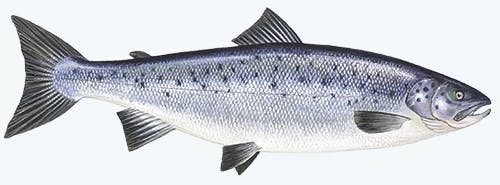All feed formulas developed by Aller Aqua at the Aller Aqua Research Centre follow these requirements to ensure proper growth and health:
High-Protein Diet: In the freshwater phase, Atlantic salmon require a diet with 45-55% protein, primarily from fish meal, plant proteins, and insect-based sources.
Moderate Fat Content: A fat content of 15-25% provides essential energy and omega-3 fatty acids.
Nutrient-Dense Pellets: Formulated feed includes vitamins (A, C, D, E, B-complex) and minerals (calcium, phosphorus, selenium) to support immune function and bone growth.
Feeding Adjustments:
Fry & parr: Fed small, high-protein pellets.
Smolt: Gradually transitioned to a diet preparing them for saltwater adaptation.
